#choujin x tokio
Explore tagged Tumblr posts
Text
Finished it 😼 Rly proud of how this came out as it's been a while since I used traditional drawing materials


#choujin x tokio#choujin x fanart#choujin x#tokio kurohara fanart#tokio kurohara#pilledart#sui ishida
11 notes
·
View notes
Text

Choujin X is amazing. Tokio and Azuma are my favorites
9 notes
·
View notes
Text
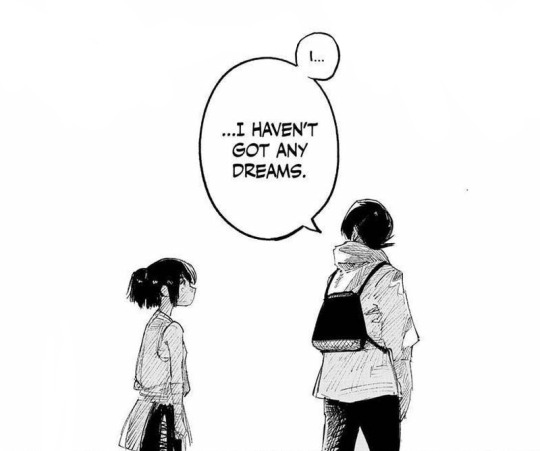
#choujin x#tokio kurohara#manga cap#manga#mangacap#manga caps#monochrome#mangacaps#shounen#shounen jump#shounen manga#weekly shounen jump#shonen jump#manga page#manga post#manga panel#monochrome manga#manga daily#dailymanga#daily manga
497 notes
·
View notes
Text



“Choujin X” by Sui Ishida (Volume Covers)
#choujin x#sui ishida#tokio kurohara#ely otta#azuma higashi#noh mask#chandra hume#sora siruha#palma shishinegura#simon kagomura#maiko momoma#yubiko#manga#volume covers
55 notes
·
View notes
Text
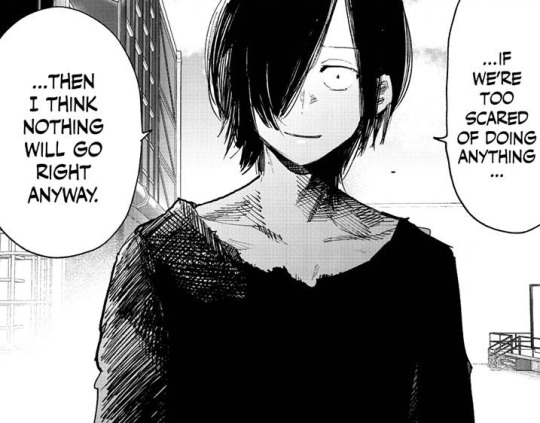
238 notes
·
View notes
Text

Happy new year from Ishida Sui 🎍
#azuma higashi#tokio kurohara#ely otta#ely otsuta#palma shishinegura#choujin x#cjx#ishida sui#sui ishida#tokyo ghoul#manga#seinen
213 notes
·
View notes
Text

Been reading Choujin X!
#illustration#art#artists on tumblr#my art#choujin x#sui ishida#tokyo ghoul#tokio kurohara#azuma higashi#anime#manga
24 notes
·
View notes
Text
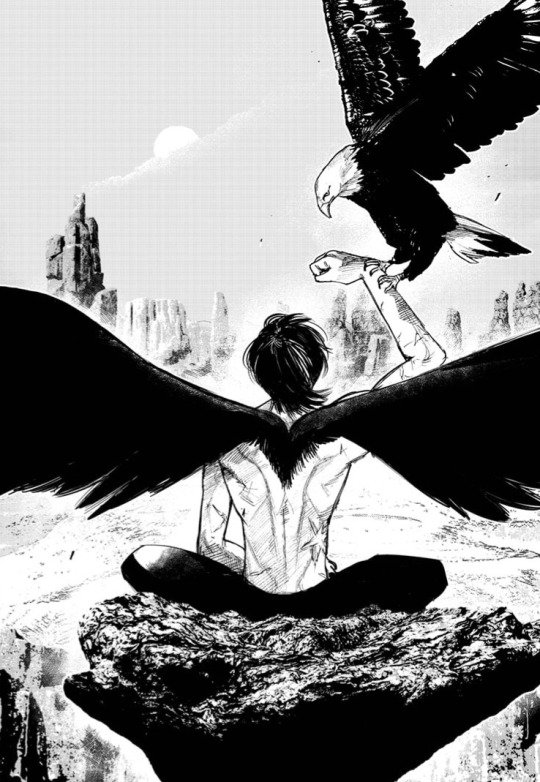
超人X
#超人X#manga#monochrome#choujin x#superhuman x#daily manga#dailymanga#manga panel#tokio kurohara#kurohara tokio#black and white#manga series#manga cap#manga caps#manga edit
817 notes
·
View notes
Text

"I hate Glénat," says guy who says "I love Glénat" whenever they release anything new about Tokyo Ghoul
#could have been centipede for a better visual parallel but i like shironeki too much to actually complain#tokyo ghoul#choujin x#kaneki ken#kurohara tokio
174 notes
·
View notes
Text
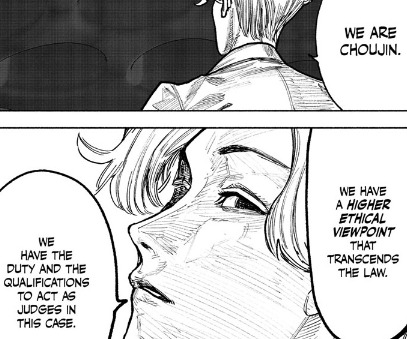
The Great Man Theory of Choujin X
In Crime and Punishment, the 1866 novel by Fyodor Dostoevsky the main character Raskolnikov schemes to murder and rob an elderly pawnbroker. The reason he wants to murder this pawnbroker is not just because he is in debt, but to prove his theory of mankind. For Raskolnikov, all men are divided into two categories: ordinary and extraordinary. The ordinary man has to live in submission and has no right to transgress the law because he is ordinary. On the contrary, extraordinary men have the right to commit any crime and to transgress the law in any way. We have seen this ethical argument play out again and again in Choujin X in the past few chapters of Choujin X, so I think it's time to take a closer look under the cut.
In Raskolnikov's view extraordinary men are extaordinary they are men who have the gift or talent to alter the world. It is the extraordinary men who forge civilizations to new heights of achievements. Therefore it is the extraordinary man who has the inner right to decide whether to overstep any law or any obstacle that stands in the way of the practical fulfillment of his ideas.

Sato, Tokio's mentor refers to great men of history in a similiar way, as if they were some kind of oppressed class who the laws that protected the masses only hindered.
Choujin, by Sato's viewpoint have the right to transgress the law because the law is made to regulate the masses, that is ordinary humans and not Choujin. By drawing a line between those without superpowers who are in the majority, and those with powers who are in the minority, Sato is dividing humans and Choujin into two separate categories and saying Choujin are inherently superior and have the right to transgress. That he has the right to transgress, because he has a power he was born with.
"I simply hinted that an extaordinary man has the right... that is not the official right, but an inner right to decide in his own conscience to overstep... certain obstacles, and in only case it is essential for the practical fulfillment of his idea (sometimes, perhaps, of benefit to the whole of humanity.) .... I maintain that if the discoveries of Kepler and Newton could not have been made known except by sacrificing the lives of one, a dozen, a hundred or more men, Newton would have had that right, would indeed have been duty-bound to eliminate the dozen or the hundred men for the sake of making his discovery known to all of humanity. But it does not follow from that Newton had a right to murder people right and left and to steal every day in the market. Then, I remember, I maintained in my article that all... well, legislators and leaders of men, such as Lycrugus, Napoleon, and so on were all without exception crimminals [...] in fact many of these benfactors and leaders of humanity were guilty of terrible carnage."
What Raskolnikov is describing here fits the description of the Nietzschian Ubermensch to a T, and in fact it was Crime and Punishment that served as an inspiration for Nietzsche's philosophy.
However, Raskolnikov in the book is far from the Nietzschian ideal. He's described as perpetually gloomy, overly anxious, constantly sick, he's incredibly in debt, barely leaves his house, faints at the drop of a hat. He's no crimminal genius either as when he finally pulls off the crime that he spends the first third of the book plotting he (1) makes a mistake and has to kill a witness, (2) doesn't even rob the pawn broker just grabs a bunch of her stuff and runs (3) takes all the jewlery he took and buries it under a rock and never touches it again.
Clearly, we're working with a crimminal mastermind here.
"A hundred thousand good deeds could be done and helped, on that old woman's money which will be buried in a monastery! Hundreds, thousands, perhaps, might be set on the right path, dozens of families saved from destitution, from ruin, from vice. Kill her, take her money, and with the help of it devote oneself to the service of humanity and the good of all. What do you think, would not one tiny crime be wiped out by thousands of good deeds?"
Raskolnikov's logic is that he will commit one crime and then use the money for the betterment of humanity, only to axe murder a defenseless old lady, a defenseless simpleton, and bury that money under a rock. Perhaps there's a lesson to be learned here.
Charity is just Raskolnikov's justification, his true motive for his crime is to prove his great man theory, and that he's capable of being one of those extraordinary individuals that can change the world by having the werewithal to commit a murder. Raskolnikov wants to divide humanity into superior and inferior, extraordinary and ordinary, and he wants to be in the superior category.
"Thank you, but tell me this. How do you distinguish those extraordinary people from the ordinary ones? Are there signs at their births? I feel there ought to be more exactitude, more external definition. Excuse the natural anxiety of practical law-abiding citizens, but couldn't they adopt a special uniform, for instance, couldn't they wear something, be branded in some way? For you know if confusion arises and a member of one category imagines he belongs to the other, begins 'eliminating obstacles" as you so happily express then..."
In the story the police officer who is hunting Raskolnikov begins easily pointing out the many flaws in Rask's theory of dividing people into two discrete categories. Fortunately for Sato, in Choujin X he has something that is determined for him at birth that he thinks marks him above the laws and restrictions of ordinary people.
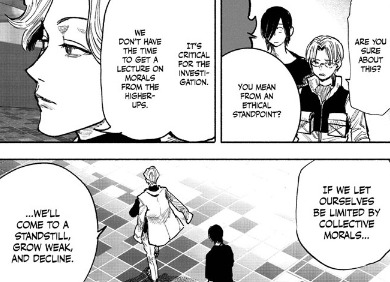
Sato's argument is not that they're going to save more people by taking the route that they're doing, but rather because they are born as Choujin they have an inherent superiority to other people that makes it so the rules don't apply ot them. Having superpowers apparently gives you a moral imperative no matter what those powers are.
Before going further onto the scene I want to remind you that Tokyo Ghoul Ishida's previous work is one of the few works that has ever gruesomely depicted what an evil thing torture is onscreen. It leaves permanent scars in both the main character, and everyone the main character goes onto hurt after the fact.
Jack Bauer Syndrome: Hollywood's Depiction of the National Security Law opens like this.

This "ends justify the means" ideology, or "right to transgress for the greater good" is an idea soaked in our culture, it doesn't just show up in Crime and Punishment and Choujin X. After justifying himself this way, Sato then proceeds to do something which is more or less just torture.

After Palma (willingly cooperating I might add) slices both of her arms up to try to raise a witness from the dead, Sato then orders her neck to be cut open so she can continue to bleed more, in spite of Azuma and later Tokio's protests. The only one who seems to call out his ethical higher viewpoint before he starts torturing her is Azuma.
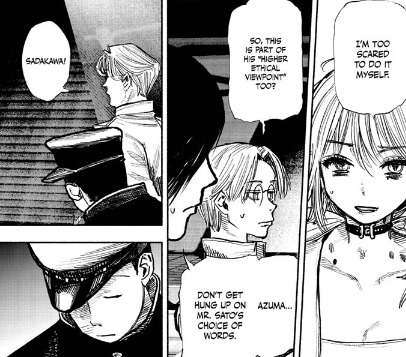
Now, let's say that everything didn't go Sato's way. If Palma just died, or if she'd chaosified and hurt or even killed everyone in the room would Sato have faced any sort of consequence whatsoever? Was he willing to take responsibility if things went wrong? Would have he willingly gone to prison for murdering a person who still has civil rights even if she's currently their prisoner?
I doubt it.
You would think someone with a higher moral imperative, would also hold themselves to that same ethical standard. However, for Sato freedom from restraints under the law also seems to mean freedom from consequences. If Palma had died here, then I doubt Sato would have faced any legal consequences for his actions or have had his power restricted in any way. So, isn't it lucky that everything just happened to work out?
Choujin X seems in part to be deconstructing this very Jack Bauery "It's okay to torture people because that was the only way to stop the ticking bomb and save everyone, and the ends justify the means every single time" kind of logic, with it's discussion of fate, prophecies and Yamato Mori, and Sora Shihouin's role in history.
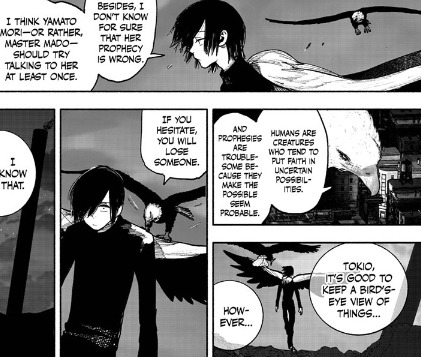
The bird that Tokio talks to is the first character to put the suggestion that maybe none of the prophecies true, they're only true because people have faith in them because they want to think there's a sure thing in life.
Sora's absolute confidence in her prophecies and the ideas of a pre-determined future, lead her to committ atrocities in the name of averting future disasters she is absolutely sure is going to happen.

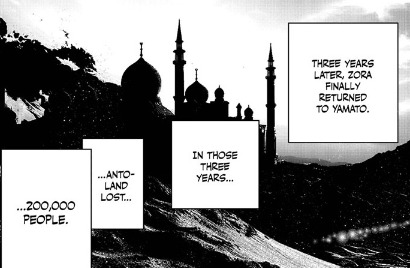
What's 200,000 deaths if Sora was averting the millions of dead she saw in her visions?
From a simple, utilitarian trolley problem perspective if you were to ask most people on the street "Would it be okay to sacrifice 200,000 people if it saved ten million" they'd say yes just based on the numbers. Partially because the human mind cannot even comprehend death on that scale.
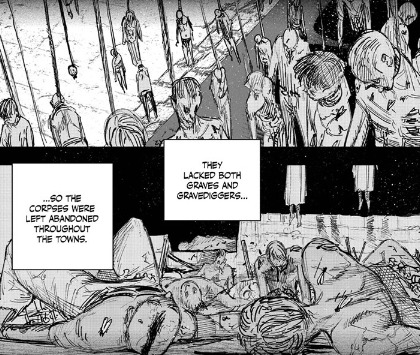
However, the problem with utilitarianism nothing is definite. The ends do not justify the means if the means themselves are uncertain. It's easy to say it's okay to sacrifice 200,000 for 10,000,000 but there was no saying for sure that ten million were actually going to die.
Sora saw one thing. Mado saw another thing. For all we know they could have both been wrong. There's no indication that Choujin X takes place in a deterministic universe with a fixed future, especially since there are multiple seers having different visions which would imply the opposite of that. That there's not one predetermined fate. Sora went and killed those people on the hypothetical possibility that there MIGHT be a disaster in the future she was trying to avert.
Sora was Jack Bauering all over the continent of Anitise. She had to torture those people, otherwise the bomb was going to go off. That only happens in fiction though, becaues study after study after study shows up torture and abuse in prison does not in fact save the day. For the most part it doesn't even happen under dire circumtsances, it happens because guards, police, and authorities are give too much power under the people they keep imprisoned. It's not an ethically dubious way of attaining information to save the day, it's just a common, everyday, abuse of power.
Sora believes just as Sato does, that having power gave her the inherent right to transgress.
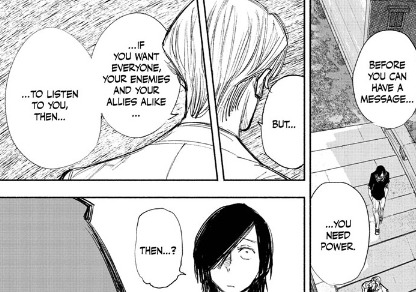
Sato is beginning to more and more hint that the power that Choujins have give them the right to transgress. In a sick way Sora began to mirror Queem in her actions later on in life.

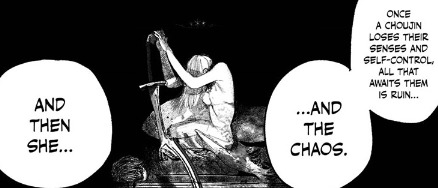

They both became opium addicts. They both fought and fought and fought until they lost the ability to maintain their human form. They both invaded someone else's sovereign territory, instigated a war, and then committed genocide.
Most of all they both believe in their own superiority. While Queem believed in Choujin Supremacy seeing himself as a conqueror and a warlord, Sora has a savior complex, invading foreign territories under the dubious reasoning of "saving them" and committing atrocities that look like modern-day religious crusades.
Why did both of them do what they did?
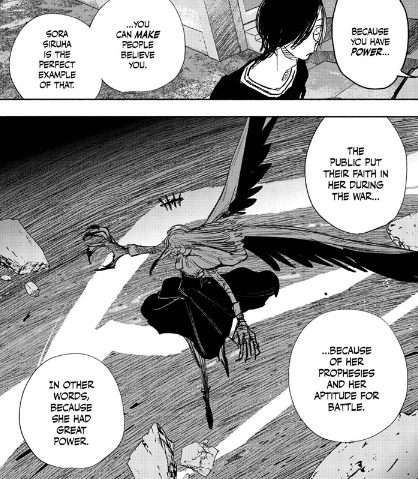
Because they believed the power they had gave them the right to transgress, and because other people who believed the same went along with their actions and helped them.
#cx meta#choujin x#sora shiunin#azuma higashi#tokio kurohara#choujin x meta#choujin x spoiler#choujin x 49.3#cx 49.3
124 notes
·
View notes
Text
Uhhhh uhhh Tokio redraw or whatever with different brush uhhh uhhhh


#choujin x#choujin x tokio#choujin x fanart#tokio fanart#tokio kurohara#tokio kurohara fanart#pilledart#sui ishida
4 notes
·
View notes
Text





warm up sketches and misc stuff from a couple months ago
#choujin x#tokio kurohara#chainsaw man#beam csm#kobeni#original art#original character#fanart#homestuck#kanaya maryam#karkat vantas#my art
36 notes
·
View notes
Text
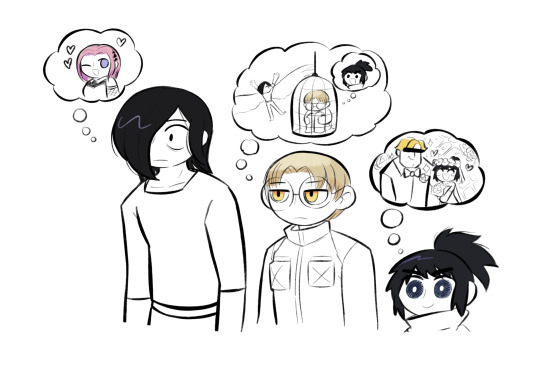

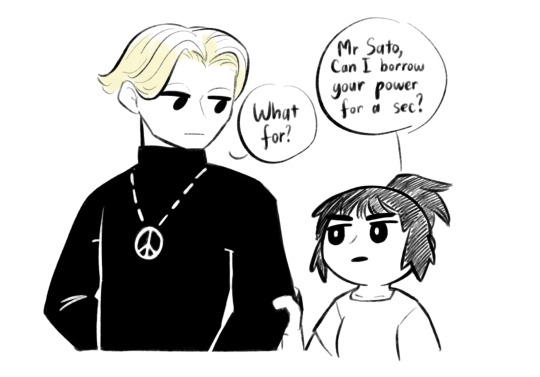


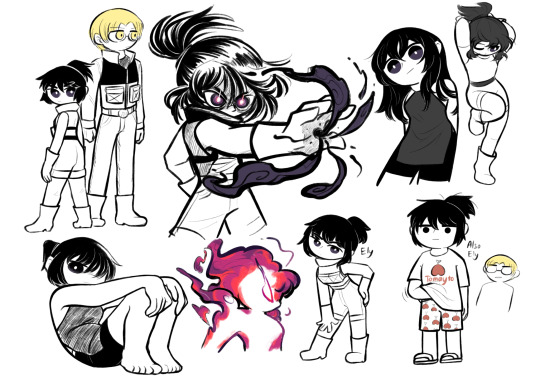




Been getting into Choujin X lately
I love Ely sm, Azuma is up there too
#my art#comic#shitpost#choujin x#super human x#ely otta#azuma higashi#tokio kurohara#ichiro sato#I’m an AzuEly fan now#been taking a break from crk because of my personal stuff as well#maiko momoma
71 notes
·
View notes
Text

Choujin X, Volume 11 bonus illustration featuring Ely and Palma. Also smol Tokio and Azuma 🥺
#choujin x#official illustration#ely otta#palma shishinegura#tokio kurohara#azuma higashi#sui ishida#choujin x volume 11
16 notes
·
View notes
Text
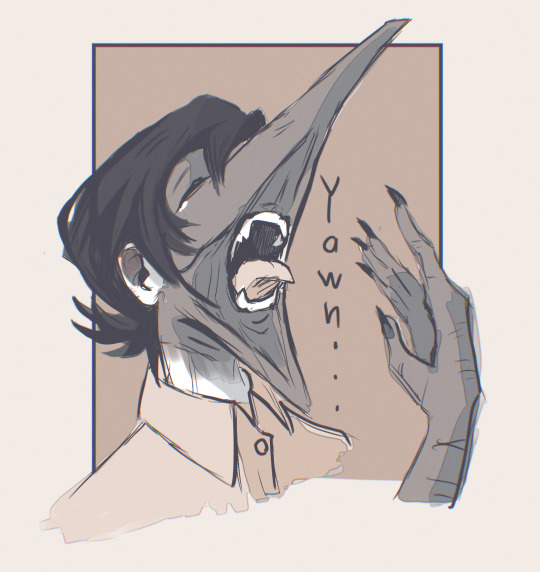
I am compelling the masses to read Choujin X. It's not Tokyo Ghoul and if you go in expecting the exact same feeling you will be disappointed, but it's a fun ride in its own right.
#Quinn said I'd like batista so I figured I'd read the manga between rote chapters 'cause sometimes fitzchivalry makes me want to scream. So!#I'm liking it and here's a little doodle while I work on a bigger piece.#This referenced from a specific panel I can't find now but he was eating something#mediocre art#choujin x#tokio kurohara#kurohara tokio
150 notes
·
View notes
Text

62 notes
·
View notes